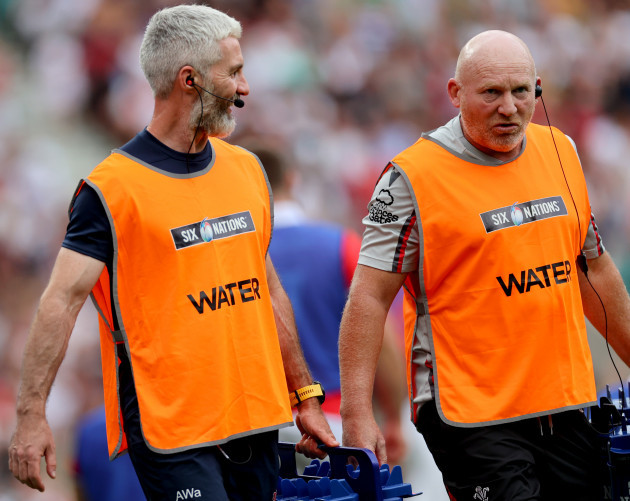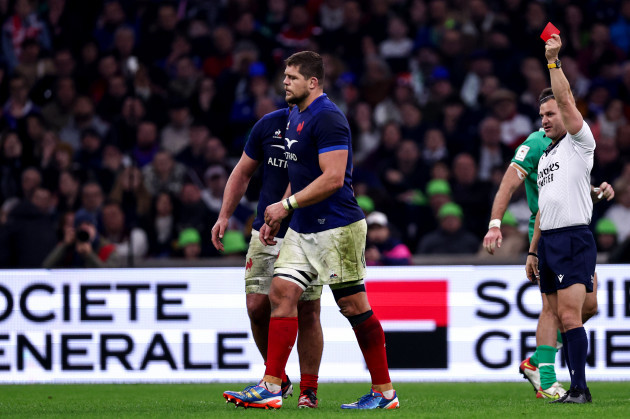WORLD RUGBY WANTS the sport to be sexier and safer, so they’ve come up with a series of law tweaks they hope will broaden its appeal and reduce injuries.
The most recent discussions about these tweaks took place at a ‘Shape of the Game’ conference in London earlier this month. Here’s a guide to what a gathering of top coaches, player representatives, match officials, and administrators came up with.
Laying down the law
The first measure World Rugby is taking is to ask referees to more strictly police a few of the game’s existing laws.
Of chief interest to everyone who sighs in frustration at the agonisingly slow box kick set-ups that are so common in rugby now is that fact that referees are being asked to consistently enforce the “use it” call.
This means that when the ball is playable at the back of a ruck and the referee tells the team in possession to use it, they have to do so within five seconds. If they don’t, it’s a scrum turnover to the opposition.
We constantly hear referees calling “use it” but then not following up five seconds with a scrum to the other team. It’s rare that officials actually award the scrum but now World Rugby want no messing around – speed up the game or lose the ball.
The governing body is also asking match officials to be strict on water carriers coming onto the pitch. In 2022, World Rugby specified that teams can only have two water carriers, not including their director of rugby, and that they could not address referees.
Last weekend, we heard Wales assistant coach Neil Jenkins having a fairly heated exchange with French referee Mathieu Raynal during a Six Nations game.
World Rugby doesn’t want to see anything like that again, while the hope is that play can also resume quicker without a whole squad of water carriers running on.
Finally, referees are being asked to ensure that hookers always use the ‘brake foot’ in scrums.
This means hookers need to maintain a split stance even on the ‘bind’ call at scrums to maintain stability. Again, this is already in the laws but can be overlooked. World Rugby hopes strict enforcement results in fewer collapses and safer scrum contests.
Tweaking the law
The next step for World Rugby is voting on a series of law adjustments that could move to a ‘global trial’ level, meaning across the entire game.
The next World Rugby Council meeting is on 9 May and they will consider several proposals. Generally speaking, if a law suggestion makes it as far as the council, there’s a strong chance of it being voted through, but these aren’t completely set in stone yet.
First and most controversially, the council will decide whether the 20-minute red card comes into play across the game. It’s currently used in Super Rugby and the Rugby Championship in the Southern Hemisphere.
It means that a player who is red-carded can be replaced by another player 20 minutes after they have been sent off, restoring their team to 15 players. There has been scope for referees to give permanent red cards that mean the player can’t be replaced but that is reserved only for extremely violent acts, which so rarely happen in the modern game.
The 20-minute red card has strong support from the likes of New Zealand and Australia, with the argument being that red cards can ‘ruin games’ as a contest. The other side of the coin is the argument that dangerous foul play has to be severely sanctioned, particularly as rugby deals with huge concerns over concussion.
World Rugby says that this proposal for 20-minute red cards comes with a consideration for “stronger off-field sanctions” for foul play so that players are still on high alert with their actions.
Red cards mean that the team with more players has a far stronger chance of winning the game but moving to a global trial of the 20-minute red card would seem at odds with all that World Rugby has been doing to prove it is taking concussion as seriously as it possibly can. This is a huge decision for the council.
It is expected that the council will formally outlaw the ‘croc roll‘ at this meeting in May.
This is a technique that attacking players use to remove defenders who are ‘jackaling’ over the ball at the breakdown in a bid to win a turnover. The arriving attacker wraps the defender’s upper body and then uses their own bodyweight and momentum to roll the defender away to the side. That has caused some catastrophic injuries as the attacker’s body has sometimes trapped the defender’s knee.
It would be intriguing to see how this possible law change affected the breakdown. While the ‘croc roll’ has caused some horrific injuries, it is also regularly used without causing injury. Sometimes, arriving players have little other option to remove jackals, who have often got into a strong position with initial illegal actions such as using their hands on the ground to balance themselves.
Law changes can result in unintended consequences but everyone wants a safer game. Defence coaches will be licking their lips and encouraging their players to jackal even more.
The council is also set to vote through a law tweak that will close the ‘Dupont Law’ loophole, as has already happened in Super Rugby. The farcical scenes in Scotland’s clash with France during the Six Nations have sped up this process.
If you’re keen to read more about how teams have been exploiting the loophole, check out this piece on Dupont’s France and this one on the Scoland v France game.
And finally, the World Rugby council will consider a recommendation to remove the option of a scrum when a team has won a free-kick at a scrum.
The idea is to reduce longer sequences of scrums within games. So if a team is awarded a free-kick at a scrum, say for the opposition engaging before the ‘set’ call, they cannot opt for another scrum.
The team awarded the free-kick will have to tap it and play or kick it instead.
This has led to concerns that weak scrummaging sides could deliberately give away a free-kick to avoid the possibility of conceding scrum penalties. That would be a farcical situation and totally against the notion that rugby should be a contest in all aspects.
Trialling the law
World Rugby is also hoping that individual unions or leagues will take on a few ‘closed trials’ that apply only to their specific competitions and are not done across the entire sport.
Some of the suggestions are interesting. One of them is that if a throw into the lineout isn’t straight but the opposition doesn’t get into the air to contest, then it’s play on.
This prevents the game being stopped and a scrum being set, although you’d imagine there will be some guideline on just how crooked the throw can be.
World Rugby also wants someone to trial a tweak whereby the ball has to be played away from the maul when it has been stopped once, rather than twice as is currently the case.
Strong, patient mauling teams clearly won’t be in favour of any such trial, but World Rugby again sees it as a means to getting the ball away from heavily congested areas.
Another suggestion is for teams to be able to mark the ball inside their own 22 from a restart.
Currently, teams can only mark the ball in their 22 from a kick in open play, not from restarts.
The thinking with this possible change is that teams wouldn’t kick off long into their opponent’s half, where the other team would field the ball and go into their ‘exit’ routine that concludes with a box kick.
Teams taking restarts would be encouraged to go shorter, probably competing to win the ball back, and there might be more exciting exchanges of play as a result.
The last suggestion from World Rugby is for trials that protect the scrum-half at the base of scrums, rucks, and mauls. Recently in top-level rugby, we have seen defences become excellent at making things scrappy for the opposition scrum-half.
They work hard to be on top of the scrum-half, often snagging them as soon as they’ve lifted the ball, and generally doing their best to prevent the ball from being played away cleanly. World Rugby wants to see unions trial law changes that clean things up for the scrum-halves.
Discussing the laws
The last action point from the Shape of the Game conference is for working groups to be set up.
Specialist working groups will be organised in these areas:
- On- and off-field sanctions
- Tackle/ruck/breakdown
- Television Match Official (TMO) protocol
- Replacements
- Fan experience
- Tackle height
The working group focused on sanctions will review rugby’s disciplinary process, both during and after games. This is a much-needed move given the sheer confusion within rugby about which sanctions should apply for certain acts of foul play. Player suspensions seem to be completely inconsistent and even match officials struggle to find collective agreement on the correct sanctions during games.
The tackle and breakdown group must assess the safety and spectacle of that area of the game, which is so integral to rugby. The jackal turnover has become a huge part of the sport but this working group must consider if it is the best means for contesting possession.
As for the TMO, discussions will centre around what these officials should actually provide during games and how the referee should interact with them. As we saw in Scoland’s recent defeat to France, the TMO review process can cause huge debate.
Another working group will assess whether the eight replacements currently allowed in the professional game is the ideal number. They will discuss player safety and whether fewer substitutions would create more space on the pitch due to fatigue.
The ‘fan experience‘ panel will consider how supporters engage with the game and vice versa, including a review of the language and terminology used within rugby.
And finally, another group will assess the tackle height law trials currently operating in amateur rugby in 11 different unions, including Ireland.
This panel will make a recommendation to the World Rugby council on whether the tackle height trials should extend into the professional game.






